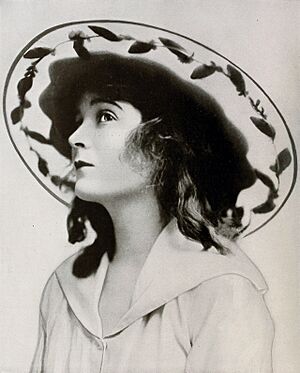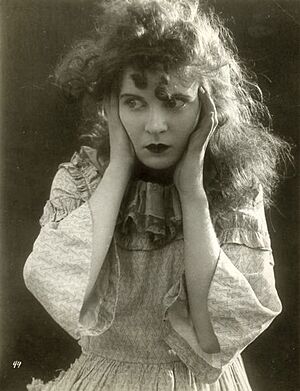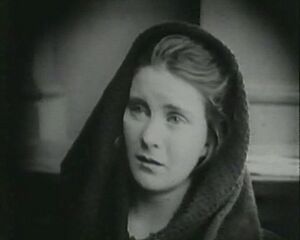Mae Marsh facts for kids
Quick facts for kids
Mae Marsh
|
|
|---|---|

Publicity photo of Marsh, 1916
|
|
| Born |
Mary Warne Marsh
November 9, 1894 Madrid, New Mexico Territory, U.S.
|
| Died | February 13, 1968 (aged 73) |
| Resting place | Pacific Crest Cemetery Redondo Beach, California |
| Occupation | Actress |
| Years active | 1910–1964 |
| Spouse(s) |
Louis Lee Arms
(m. 1918) |
| Children | 3 |
| Relatives | Marguerite Marsh (sister) Frances Marsh (sister) Oliver T. Marsh (brother) |
Mae Marsh (born Mary Warne Marsh; November 9, 1894 – February 13, 1968) was an American film actress. She had a long career that lasted over 50 years. Mae Marsh became famous during the silent movie era, working with important directors like D. W. Griffith. She was known for her natural acting style.
Contents
Early Life and First Steps in Film
Mae Marsh was born Mary Warne Marsh in Madrid, New Mexico Territory, on November 9, 1894. She was one of seven children. By 1900, her family moved to El Paso, Texas. Her father worked as a bartender. After her father died in 1901, her mother remarried. The family later moved to California. Mae went to school in Hollywood.
Many stories were told about Mae's childhood. One popular story said her father was a railroad auditor who died when she was four. It also said her stepfather died in the 1906 San Francisco earthquake. However, these stories were not true. Her father was a bartender, and her stepfather was alive after the earthquake.
Mae started working as a salesgirl. She spent time near movie sets while her older sister worked on a film. Mae began as an extra in different movies. Her first important role was in the film Ramona (1910) when she was 15 years old.
Mae once said, "I tagged my way into motion pictures." She followed her sister to the old Biograph studio. One day, director Mr. Griffith noticed her. He put her in a picture, and that was her big chance. She loved her work and continued acting for many years.
Becoming a Star Actress
Mae Marsh worked with D. W. Griffith in small roles at Biograph. Her big chance came when Mary Pickford, a famous actress at Biograph, refused a role. The part was Lily-White in the film Man's Genesis. Mary Pickford did not want to play the part.
Mr. Griffith then said that if Mary Pickford would not play that role, she would not get the main part in his next film, The Sands of Dee. Other actresses also refused the part. Mae Marsh was then asked to try.
Mae remembered the moment: "Mr. Griffith said, 'Well now, Miss Marsh, you can rehearse this.' And Mary Pickford said 'What!'" Mae was thrilled to get the opportunity. She ended up playing the main role in The Sands of Dee.
Working with Mack Sennett and D. W. Griffith, Mae became a very busy actress. She sometimes made eight movies in one year. She often played romantic roles with Robert Harron.
Her Role in The Birth of a Nation (1915)

Mae Marsh played the "Little Sister" in the famous "cellar scene" in The Birth of a Nation. In this scene, soldiers invade her family's home. Mae explained her unique acting approach for this part.
She said that a typical director might tell an actress to "Cry! Drop to your knees in terror!" But Mr. Griffith asked Mae what she did when she was truly terrified. Mae replied, "I laughed."
Mr. Griffith understood her idea right away. He said, "Good, let's try it." Mae's hysterical laugh in the scene was very powerful. It showed terror in a new and different way.
Her Performance in Intolerance (1916)
Mae Marsh gave one of her most memorable performances in D. W. Griffith's film Intolerance. She played a character called the "Dear One." Film experts say her acting in this movie was very important to its success.
Film historian Paul O’Dell said that Mae Marsh's portrayal was outstanding. Another expert, Sir Alexander Korda, called her performance one of the best in the silent film era.
Mae Marsh wrote in her 1923 book Screen Acting about how hard it was to film the courtroom scene in Intolerance. She said, "The hardest dramatic work I ever did was the courtroom scene in Intolerance." They filmed the scenes four different times. Each time, she gave all her energy and skill to the role.
After Intolerance, Mae signed a big contract with Samuel Goldwyn. She earned $2,500 per week, which was a lot of money back then. However, the films she made with him were not as successful. After she married Louis Lee Arms in 1918, she made fewer movies.
Her last major starring role was in Griffith's film The White Rose (1923). She also starred in The Rat (1925). In 1955, Mae Marsh received the George Eastman Award for her great contributions to film.
Later Career in Sound Films
Mae Marsh came out of retirement to act in sound films. She appeared in Henry King’s remake of Over the Hill (1931). She started taking on "character roles," which are supporting parts that add to the story. She continued acting in this way for many years.
Mae appeared in popular films like Rebecca of Sunnybrook Farm (1932) and Little Man, What Now? (1934). She also worked with director John Ford many times. Some of these films include The Grapes of Wrath (1940), How Green Was My Valley (1941), and The Searchers (1956).
Mae Marsh has a star on the Hollywood Walk of Fame. It is located at 1600 Vine Street.
Personal Life and Legacy
Mae Marsh married Louis Lee Arms, who was a publicity agent for Samuel Goldwyn. They got married in Manhattan on September 21, 1918. The couple had four children. They stayed together for 50 years until Mae died in 1968 from a heart attack. Louis lived to be 101 years old and passed away in 1989. They are buried together in Pacific Crest Cemetery in Redondo Beach, California.
Selected Filmography
Mae Marsh appeared in many films throughout her long career. Here are some of her notable movies:
Silent Films
- 1910: Ramona
- 1912: Man's Genesis
- 1912: The Sands of Dee
- 1914: Judith of Bethulia
- 1915: The Birth of a Nation as Flora Cameron
- 1916: Hoodoo Ann
- 1916: Intolerance as The Dear One
- 1917: Polly of the Circus
- 1923: The White Rose
- 1925: The Rat
Sound Films
- 1931: Over the Hill as Ma Shelby
- 1932: Rebecca of Sunnybrook Farm as Aunt Jane
- 1934: Little Man, What Now?
- 1940: The Grapes of Wrath
- 1941: How Green Was My Valley
- 1947: Miracle on 34th Street
- 1948: 3 Godfathers as Mrs. Perley Sweet
- 1956: The Searchers
See also
 In Spanish: Mae Marsh para niños
In Spanish: Mae Marsh para niños
 | Jessica Watkins |
 | Robert Henry Lawrence Jr. |
 | Mae Jemison |
 | Sian Proctor |
 | Guion Bluford |


